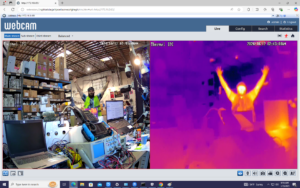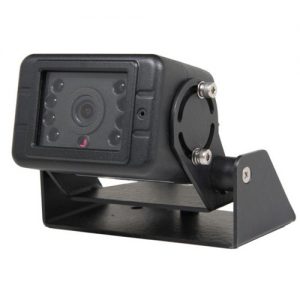
Sawmills and wood processing plants are not the only industrial operations that regard the CC02 as invaluable
Innovating is second nature to camera solutions supplier, Opticom
It’s a scene typical of any sawmill in North America: a debarker machine hammers away at its task with a tiny camera mounted on the framework, monitoring the process. The vibration is relentless, but the video feed is constant and clear.
Most closed-circuit video cameras would be hard pressed to be mounted anywhere near this machinery, never mind on it – but this is no ordinary camera. It is the Opticom Technologies CC02 Series camera, built for just such an application.
Opticom is no stranger to developing video solutions for out of this world situations. In the 1970s it rose to the challenge of the Space Shuttle program by developing varifocal lenses that would function seamlessly in space. As Opticom president and founder David Boyd explains: “It’s always been about finding video solutions to difficult applications. We love the challenge.”
In the 1990s, Opticom saw the potential for cameras built for harsh environments, specifically the British Columbia sawmill industry. After many months of development, Opticom released the CC02 Series Camera – the ultimate camera for high vibration applications. The CC02 soon fulfilled the needs of the dozens of BC mills, and mills across Canada began purchasing the camera on a regular basis to replace the `security-style’ cameras they had been using, or when a new line was implemented.
The CC02’s success was amazing. In certain mill locations, conditions were so extreme that the `security-style’ cameras failed after only a few months, but the CC02s have lasted for years.
The secret to the success of the CC02 is all in the design. The camera is compact, easily fitting into the palm of one’s hand. But its small size is deceptive, as the rugged titanium alloy housing is virtually indestructible. Plus, the CC02 is also totally impervious to dust, water, and can withstand temperatures from -60 to +80°C without any heater or blower required.
Opticom’s design team also developed a unique universal mounting bracket for the camera that enables installation in just minutes, even the tightest spaces. This feature alone has made the CC02 a favourite with industrial installers across North America.
Tom Fulton, sawmill/dry kiln manager for Britton Lumber in New Hampshire summed it up when he said: “A great little system – installed over a half hour lunch break. The guys using it are amazed at the clarity.”
Sawmills and wood processing plants are not the only industrial operations that regard the CC02 as invaluable. In 2005, Planetworks Consulting Corporation engineer Colin Savage chose the CC02 as the video monitoring solution for the $800 million Seymour Capilano Twin Tunnels Project, which consisted of two 3.8m-wide, 7.1kmlong tunnels bored under Grouse and Fromme Mountains for water infrastructure enhancement.
Savage said: “I would challenge others to find a harsher environment than a Tunnel Boring Machine. We used cameras at multiple locations along the TBM to view progress and as indicators for material conveyance.
“These cameras were mounted beside conveyor belts, which had hard rock tunneling waste transported at high speed past the camera. It was not uncommon for small and medium sized rocks to hit these cameras on the lens and body. They stood up to this punishment 24/7, and the only thing replaced occasionally was the protective glass on the camera enclosure.”
Opticom continually researches the development of new products with new technologies. Considering that the analog video technology driving the original CC02 is nearly obsolete, Opticom has now released a new generation of CC02s based on high definition analog or TVI (Transport Video Interface) technology.
The TVI equipment is easily integrated into existing coaxial cable systems and delivers the equivalent of 2 megapixel (1080P) resolution, while retaining all of the durability and reliability customers have come to expect. This new technology allows customers to migrate to high definition video without having to rewire or re-learn video transmission.
An other Opticom product development for the sawmill industry is a camera with specialized corrosion resistant housing designed for installation inside wood kilns. “
We do our best to respond to our customers’ needs, and this is a perfect example of a unique camera developed for a very challenging application,” says Boyd.
Opticom has also developed products such as the CC04 Series camera for IP infrastructure. Like the CC02 camera, the CC04 was designed to overcome the same nasty environmental challenges and is compatible with all totally ONVIF compliant video management software platforms.
These cameras have been satisfactorily installed in many mills worldwide. The CC04 Series incorporates all the vibration resistance and durability of the CC02 in an IP format.
Today, Opticom sells cameras throughout North America and Europe to hundreds of customers in a wide range of industries that are looking for reliability and video system support.






